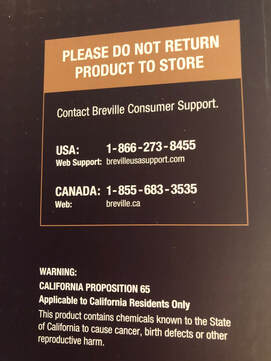
Toxicity in a coffee maker?
Apparently it is not so uncommon.
I bought a $300 unit, hoping for the best when it came to the use of plastic parts. As soon as I opened the box I found a California Proposition 65 warning inside..
If you are not from California you might not have heard of Proposition 65 and even if you are from California it may mean little to you. Prop. 65, as it is called, involves higher standards for products and materials than the FDA requires. This means that the amounts of poisons and toxicity is reduced if goods are sold in the State or it must carry a warning. It is law only in California, but because manufacturers do not want to produce two types of goods, they often upgrade or tag all of their goods to comply with California law.
The Prop. 65 warning on my new coffee maker says out loud, “Buy at Your Own Risk.” Even though the FDA thinks you will be fine, the State of California does not. Meeting California requirements does not mean that the item is non-toxic. It means only that the levels of toxicity for California are lower than federal regulations. The warning itself tells you that the product exceeds even California limits. Truthfully, neither set of regulations will keep you as safe as it should.
So what does the warning apply to in the world of coffee makers? It is yet, unknown. I wrote the manufacturer to ask precisely what aspect of the machine do not comply with California law. It is not easy to get an answer to such a question and will likely take days or weeks for a response. If you go this route, the response needs to be in writing. If you are told that the manufacturer complies with all FDA regulations, you are in trouble. That is completely unsatisfactory and to a metals contaminated person, that answer is as good as a no.
Instead of waiting for the response, I’m making the grown up decision to return my luxury coffee maker because my health is a priority. After years of illness, why would I intentionally put 2 to 4 cups of poison into my body each and every day?
If you are shopping, consider a few of these highlights of the decision making process. All plastic parts contain toxicity. This includes those plastic pods for single cup coffee makers. Many will say they are BPA free and that is good because BPA is a known carcinogen. The problem is that BPA was replace with a formula change and who knows what is in the replacement. Heating plastic allows the toxicity to leach, so 180 degrees on plastic every day of your life might not be a great idea…even though everyone else is doing it.
Another concern is aluminum. There is really no aluminum product that is fit for food service. That includes aluminum foil and cans. You are just giving Alzheimer’s the greatest of opportunities.
Then there is the issue of bacteria that can grow in coffee makers. It never occurred to me, but it did to my savvy friend who knew that water lines can grow mold. Then there are all of those dark, warm and wet spots that can easily harbor bacteria. As it turns out there are studies that say your coffee pot and your bathroom might tie for bacteria growth.
Finally, there is coffee itself. You really don’t need a dose of pesticide each and every day even if you are the picture of health. Organic beans are the start of a safe cup of coffee.
The options seem to be stainless steel and lead-free glass. That means pour over models, presses and percolators.
No bells. No whistles.